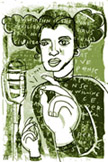
Out Loud: Preparing for a Poetry Read-Aloud
Developed by Sandy Scragg, New York City, 2002
lessons | video | poems | resources
Lesson 1: What Makes Poetry Unique?
Instructional Objectives:
1) Students will be able to describe poetry as a genre.
2) Students will be able to determine how poetry is a very singular and unique genre of literature.
Time Required: (2) 45-minute class sessions
Materials/Resources Required: Links to three poems about poetry: "Ars Poetica," by Archibald MacLeish, "Poetry," by Marianne Moore, and "The Secret," by Denise Levertov
Vocabulary & Key Concepts: genre, poetry
Procedures & Activities:
1) Write "poetry" on the board. Ask if someone can come up with a definition for poetry. (Hopefully, this will seem like a difficult question!).
2) Agree that poetry is difficult to define. Ask if any student hates poetry (there should be some hands!). Ask the students why. (possible responses: difficult to figure out, why not just say what you mean, always was boring in school) Tell students that the difficulties we have with poetry can really be looked at as something that makes poetry different. People have problems with poetry because they look at it the same way as a short story or a novel. It's not. Poetry is its own separate genre, just as a play is very different from a novel. It's read differently, because its meant to be read differently. (You may need to briefly define the term "genre" for your students.)
3) Ask students what makes poetry unique from other forms of literature. (Some responses from my class: "a poem is a brainstorm," "an expression of feelings," "what you feel inside", "can mean different things to different people," "A true form of storytelling.")
4) Divide students into three groups. Give each group one of the poems above, or direct them to the website. Ask each group to discuss what the poet is saying about poetry in general.
5) Go over the class responses. Assign the homework: bring in something that you find poetic--it can be poetry, but it does not have to be. (My students brought in photographs, a Jay-Z CD, a Public Enemy CD, their own poetry, a painting, and one student downloaded a video clip of Michael Jordan slamdunking.)
6) Students should be given an opportunity to present their poetic item. Ask them why they feel it is "poetic" to them.
7) Generate a student-generated definition based on the responses to #6. The real answer is that no one can define poetry, it's too subjective. However, try to get a working definition going in your classroom particular to your students. It's a good reference point for lessons in the future.
lessons | video | poems | resources